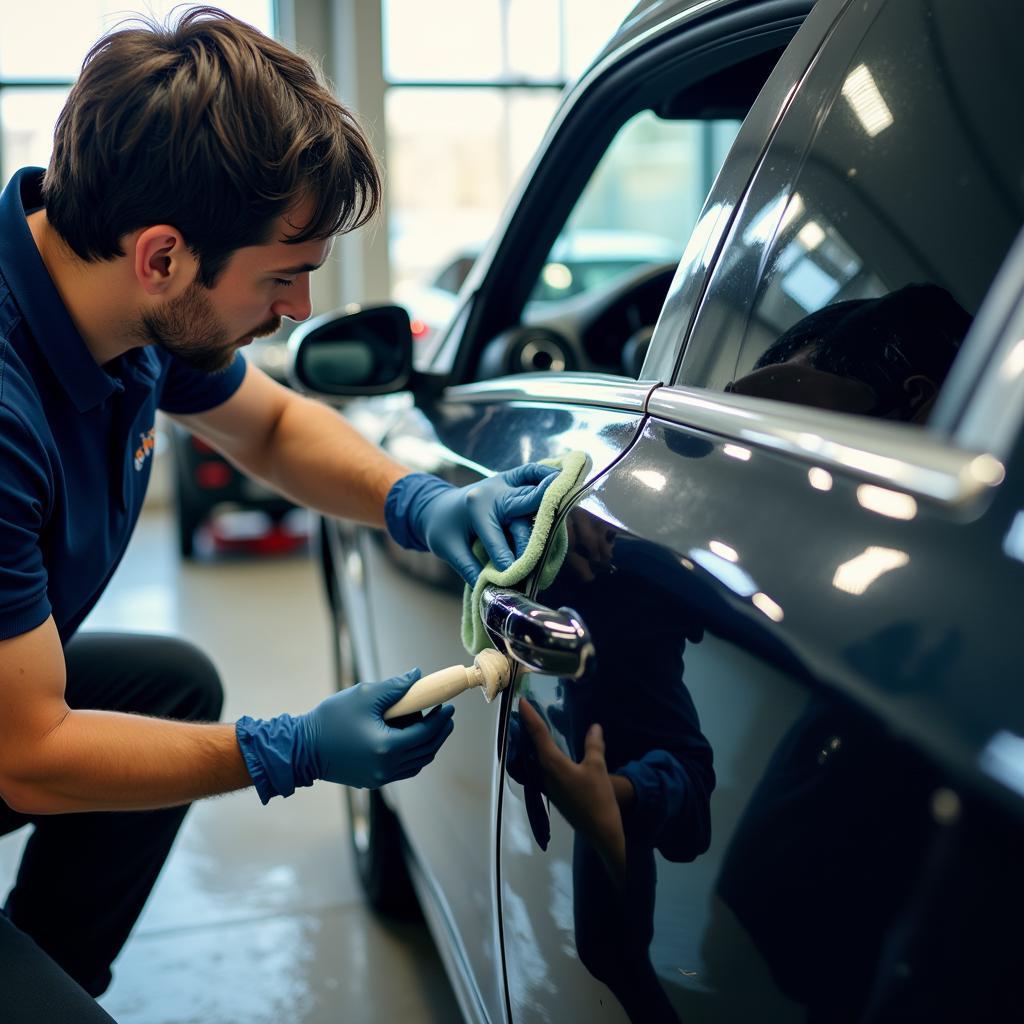A cosmetic problem on a car refers to any issue that affects the vehicle’s appearance but not its functionality. These issues can range from minor scratches and dents to more significant damage like faded paint or rust. While cosmetic problems don’t usually impact drivability, they can affect a car’s resale value and overall aesthetic appeal. Understanding what constitutes a cosmetic problem can help car owners prioritize repairs and make informed decisions about maintenance.
Similar to common Ford problems Ford cars, cosmetic issues can sometimes be a sign of underlying problems, so it’s essential to understand their causes and potential implications. Cosmetic damage can be frustrating, but knowing how to identify and address these issues can save you money and keep your car looking its best. Let’s delve into the details of what constitutes a cosmetic problem, how to identify them, and what options are available for repair.
Identifying Common Cosmetic Car Problems
Several types of cosmetic damage are frequently seen on vehicles. These can be due to various factors, including weather exposure, minor accidents, and general wear and tear. Some of the most common cosmetic problems include:
- Scratches: These can range from light, superficial clear-coat scratches to deeper ones that penetrate the paint.
- Dents: Small dents and dings can occur from door dings in parking lots or minor impacts.
- Paint Chips: Rocks and other debris can chip away at the paint, exposing the underlying metal to the elements.
- Faded Paint: Prolonged sun exposure can cause the paint to fade and lose its luster.
- Rust: This is a more serious cosmetic issue that can also affect the structural integrity of the car if left untreated.
- Cracked or Chipped Windshield: While small chips can often be repaired, larger cracks may require windshield replacement.
- Bumper Damage: Bumpers are prone to scrapes and cracks, often from minor collisions.
What Causes Cosmetic Problems on Cars?
Understanding the causes of cosmetic problems can help you take preventative measures. Common causes include:
- Weather: Harsh weather conditions, such as extreme heat, cold, and UV radiation, can damage the paint and cause fading or cracking.
- Road Debris: Rocks, gravel, and other debris kicked up by other vehicles can chip the paint and crack the windshield.
- Accidents: Even minor accidents can result in scratches, dents, and bumper damage.
- Neglect: Failing to wash and wax your car regularly can make the paint more susceptible to damage.
- Bird Droppings and Tree Sap: These can etch into the paint if not removed promptly.
How to Fix Cosmetic Problems on Cars
Depending on the severity of the damage, there are various ways to fix cosmetic problems:
- DIY Repairs: Minor scratches and paint chips can often be addressed with touch-up paint or scratch removal kits.
- Paintless Dent Repair (PDR): This technique uses specialized tools to massage dents out of the metal without requiring repainting.
- Professional Auto Detailing: Detailing services can restore the shine and luster of faded paint, remove scratches, and address other cosmetic imperfections.
- Body Shop Repairs: For more extensive damage, such as large dents, rust, or bumper damage, a professional body shop can provide the necessary repairs.
Should You Fix Cosmetic Problems on Your Car?
While cosmetic problems might not seem urgent, addressing them can be beneficial in the long run. Here’s why:
- Resale Value: A car with cosmetic damage will typically fetch a lower price than one in pristine condition. Fixing these issues can significantly increase your car’s resale value.
- Rust Prevention: Addressing paint chips and scratches promptly can prevent rust from forming, which can lead to more costly repairs down the road.
- Appearance: A well-maintained car simply looks better, enhancing your pride of ownership and overall satisfaction.
Problems with buying a car with salvage title can also be related to pre-existing cosmetic damage. It is vital to be aware of such issues before purchasing a used vehicle.
 Professional Car Detailing Service
Professional Car Detailing Service
Do Cosmetic Problems Affect Car Insurance?
Generally, minor cosmetic problems do not affect car insurance rates. However, if the damage is extensive and requires a claim to be filed, it could potentially impact your premiums in the future. Can a brand new car have problems? Yes, even new cars can have cosmetic issues, so it’s always a good idea to inspect a vehicle thoroughly before purchase.
Trading in my car to dealer with problems, especially cosmetic ones, can be tricky, as the dealer might deduct the cost of repairs from the trade-in value. Addressing these issues beforehand can maximize your trade-in value.
What are the most common problems with Tesla cars? While Teslas are known for their advanced technology, they are not immune to cosmetic issues like scratches and dents.
Conclusion
Understanding what constitutes a cosmetic problem on a car empowers you to make informed decisions about maintenance and repairs. Addressing these issues not only improves your car’s appearance but also protects its value and can even prevent more serious problems down the line. By being proactive and addressing cosmetic issues promptly, you can ensure your car looks its best and maintains its value for years to come. If you need assistance or further guidance, feel free to connect with us at Autotippro. Our team of experts is always available to help.
AutoTipPro Contact Information:
Phone: +1 (641) 206-8880
Office: 500 N St Mary’s St, San Antonio, TX 78205, United States
FAQ
- Does car insurance cover cosmetic damage? Generally, only collision coverage will cover cosmetic damage caused by an accident.
- Can I lease a car with cosmetic damage? Leasing companies typically have strict standards regarding the condition of their vehicles. Significant cosmetic damage might make it difficult to lease a car.
- How can I prevent cosmetic damage to my car? Regular washing, waxing, and parking in covered areas can help protect your car’s exterior.
- Will a car wash remove scratches? Car washes can remove dirt and grime, but they won’t fix scratches.
- How much does it cost to fix a dent? The cost varies depending on the size and location of the dent, as well as the repair method used.
- Can I sell my car with cosmetic damage? You can sell a car with cosmetic damage, but it will likely decrease its value.
- How can I tell if rust is just cosmetic or structural? Surface rust is usually cosmetic. However, if the rust has penetrated the metal, it could be a structural issue.





Leave a Reply